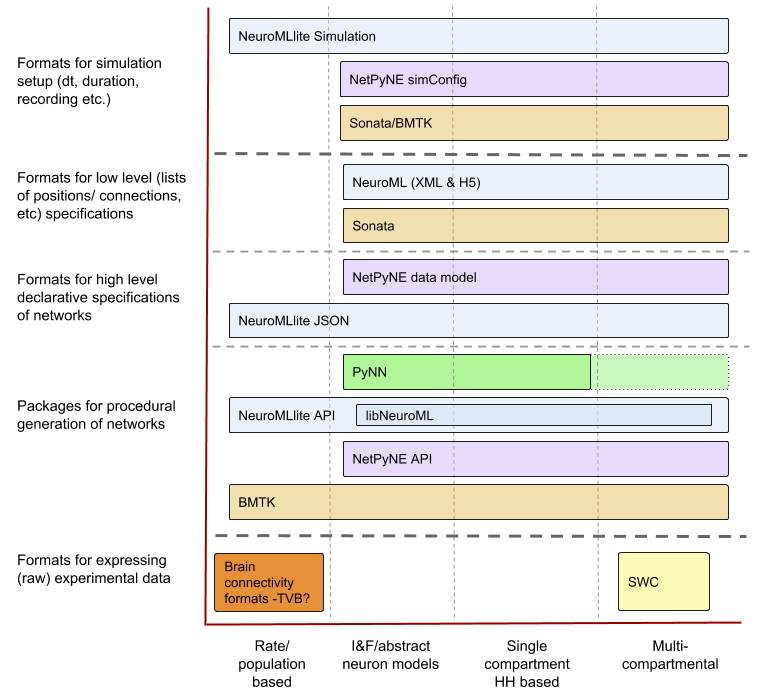A number of Special Interest Groups (SIGs) are being supported by the International Neuroinformatics Coordinating Facility (INCF) to advance areas of common interest within the neuroscience comminity.
This SIG deals with the various tools and formats for creating and sharing representations of biological neuronal networks, and will work towards ensuring these are as interoperable and usable as possible for computational neuroscientists.
The homepage for this SIG is here. This GitHub repository is intended for documents, code samples, issue tracking and links to related iniatives.
The motivation for this SIG is the ongoing development of complex data-driven models of neuronal networks, as well as the emergence of general purpose software packages and standardised formats to make it easier to build, specify and share such networks. To encourage researchers to use these common tools and formats (and ultimately create and disseminate higher quality models) we have gathered together developers creating these packages to share code and ideas, to encourage interoperability and have a forum for users and developers to find out about the state of the art and to contribute to a better ecosystem of tools and standards in this area.
The short term goals focus on highlighting and promoting existing open source initiatives working with network representations. These include, but are not limited to:
- BMTK, The Brain Modeling Toolkit: https://github.com/AllenInstitute/bmtk
- NEST: http://www.nest-simulator.org
- NetPyNE: http://www.netpyne.org
- NeuroML: http://www.neuroml.org; https://github.com/NeuroML/NeuroMLlite
- NineML: http://www.nest-simulator.org
- PyNN: http://neuralensemble.org/PyNN/
- Sonata: https://github.com/AllenInstitute/sonata
- TVB, The Virtual Brain: http://www.thevirtualbrain.org
Practical steps will include making sure these are compatible and interoperable where appropriate.

Some of the formats which are being examined in this SIG and their scope in terms of biophysical detail (x-axis) and usage in the model building workflow (y-axis).
Longer term goals including working towards minimising overlap in functionality/scope, adding other open tools/formats to the interoperability framework and ensuring the use of these (particularly low level declarative formats) are as transparent and as user friendly as possible for the modeller.
- Anton Arkhipov, Allen Institute, USA
- Tom Close, Monash University, Australia
- Sharon Crook, Arizona State University, USA
- Kael Dai, Allen Institute, USA
- Andrew Davison, UNIC, CNRS, France
- Lia Domide, Codemart, Romania & Aix-Marseille Université, France
- Salvador Durá-Bernal, SUNY Downstate Medical Center, USA
- Viktor Jirsa, Aix-Marseille Université, France
- Padraig Gleeson, University College London, UK
- Sacha van Albada, Jülich Research Centre, Germany
- Marmaduke Woodman, Aix-Marseille Université, France
A workshop entitled “Developing, standardising and sharing large scale cortical network models” was held at CNS 2018 in Seattle: http://www.opensourcebrain.org/docs/Help/Meetings#CNS_2018. A report of the meeting is available here.